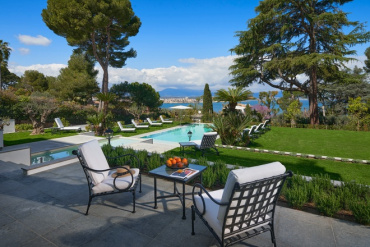
Between Sky and Sea: Navigating Property Taxes as a Non-Resident Buyer on the French Riviera
LEGISLATION
Bathed in golden light and kissed by the Mediterranean, the Côte d’Azur has long captivated aesthetes and investors from around the world. Buying property in this postcard-perfect setting is far more than a real estate transaction — it’s an invitation to embrace a uniquely French way of life.
Yet, for non-residents, certain tax considerations should be understood to ensure a smooth and serene experience — whether purchasing, renting, or eventually selling a property.
At Monty + Co Real Estate, we combine deep local expertise, a trusted network of professionals, and bespoke guidance to transform your project into a refined, flawlessly executed success.
1. Property Taxes at Purchase: What Foreign Buyers Should Anticipate
Acquisition costs: the same rules for all
In France, purchase-related costs apply equally to residents and non-residents. For existing properties, these fees typically amount to 7–8% of the purchase price, and include:
- Transfer taxes (collected by the state and local authorities);
- Notary fees (regulated remuneration);
- Disbursements (administrative costs advanced by the notary).
View the official guide to acquisition costs – Service-Public.fr
Which ownership structure should you choose?
Property can be acquired in your own name or through a legal entity such as a Société Civile Immobilière (SCI). Creating an SCI can be a strategic choice to:
- Organize shared ownership (e.g., among family or partners);
- Facilitate estate planning and inheritance;
- Enjoy greater flexibility in property management.
Every situation is unique. Consulting a tax advisor is highly recommended to tailor the ownership structure to your country of residence, personal tax profile, and long-term wealth strategy.
Financing: yes, foreign buyers can secure loans
French banks do offer mortgages to non-residents, provided there are strong guarantees (stable income, a significant down payment, etc.). Monty + Co partners with financial institutions that specialize in serving international clients.
2. Rental Income: What Are the Tax Implications?
Short-term rentals are common across the French Riviera. If you rent out your property occasionally, rental income generated in France is taxable in France — even if you reside elsewhere.
Two taxation regimes apply:
Micro-BIC (simplified tax regime):
- For annual rental income below €77,700;
- Offers a 50% flat-rate deduction (or 71% if classified as a “furnished tourist accommodation”).
Régime réel (standard tax regime):
- Mandatory for income above €77,700, or optional at lower levels;
- Allows deduction of actual expenses: maintenance, loan interest, renovations, insurance, etc.
More on rental income taxation – Service-Public.fr
Social contributions
Non-resident rental income is also subject to social charges:
- 17.2% for residents outside the European Union;
- 7.5% for residents of the EU, EEA, or Switzerland (following a 2019 ruling by the French Conseil d'État).
More on social charges – impots.gouv.fr
Offering hotel-style services?
If your rental includes services such as daily housekeeping, linen provision, personal check-in, or breakfast, you may be classified as a “para-hotelier”. This may make you liable for VAT, but also eligible for the Non-Professional Furnished Rental (LMNP) status — a highly attractive tax setup that allows property depreciation and other benefits.
3. Selling Your Property: How Capital Gains Are Taxed for Non-Residents
Non-residents selling property in France are subject to capital gains tax — calculated on the difference between the purchase price and sale price (with adjustments for eligible costs like renovations, notary fees, etc.).
A progressive tax relief applies over time:
- Full exemption from capital gains tax after 22 years of ownership;
- Full exemption from social charges after 30 years.
Before reaching these thresholds, applicable rates are:
- 19% capital gains tax on net gain;
- 17.2% social charges (varies by country of residence);
- Surtax of 2% to 6% if the net gain exceeds €50,000.
See the official capital gains guide – Service-Public.fr
Appointing a fiscal representative
If you reside outside the EU and the sale exceeds €150,000, you may be required to appoint a certified fiscal representative to ensure the correct payment of taxes in France.
4. Monty + Co: Expert Tax Support, Tailored to You
At Monty + Co, we do more than find you the perfect property.
We surround you with trusted legal and tax advisors from our network of local and international experts — offering you a clear, comprehensive view of your investment in the Côte d’Azur, in a framework that is secure, smooth, and serene.
In Summary
Buying a home on the French Riviera as a foreigner means combining lifestyle, heritage, and peace of mind. But it also calls for precision, transparency, and carefully guided support.
Whether you are looking to buy, rent, or resell, Monty + Co guides you with elegance and precision through the intricacies of the French real estate market.
Need advice on your real estate tax situation?
We’re here to create a bespoke plan that reflects your aspirations — between the Mediterranean and the hills, at the heart of a rare and refined way of life.




